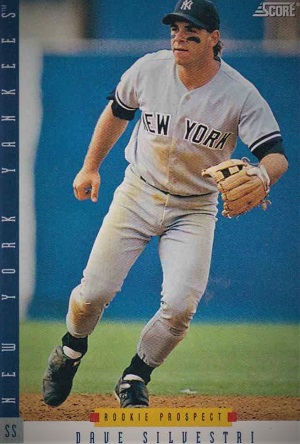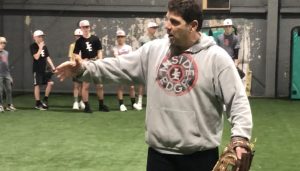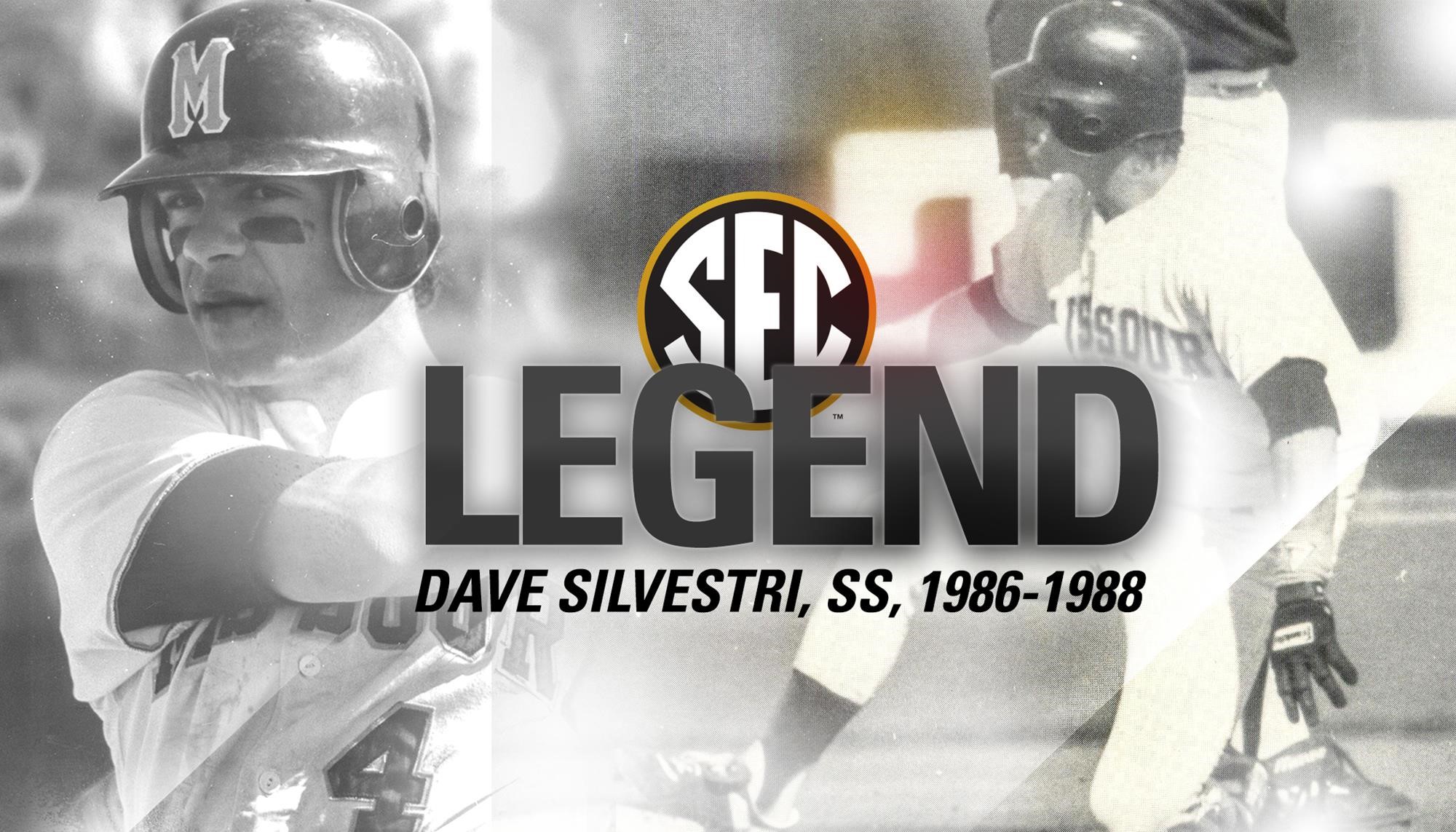Dave Silvestri is recognized as the greatest shortstop to play baseball at Mizzou. His efforts earned him first-team all-American awards in 1987 and 1988. In 1988, he was also the starting shortstop on the U.S. Olympic team that won the gold medal at the Seoul Summer Games. His storied career continued after playing for three seasons at Mizzou when the Houston Astros drafted him. He played at the Major League level with the Yankees, Expos, Rangers, Rays, and Angels. After his playing career, Silvestri was a manager in the Tampa Bay Rays organization and the Los Angeles Dodgers organization.
“Dave is a long-time friend and a real asset to our organization. I was incredibly excited when he agreed to join Inside Edge because he brings so much baseball experience and passion for this game. I asked Dave to be our Player Profile so everyone can share in his experience.” – Todd Clausen
 First, thank you for all the energy you put into Inside Edge. Anyone who has watched you coach knows just how passionate you are for this game and developing IE’s players.
First, thank you for all the energy you put into Inside Edge. Anyone who has watched you coach knows just how passionate you are for this game and developing IE’s players.
It’s an honor. And, honestly, I love having the opportunity to be a part of this. Inside Edge is a big deal that’s doing so many great things. These kids get to be taught how to play baseball by an amazing group of coaches. But, what I love most about Inside Edge is the family feel. The parents genuinely make the IE organization so successful.
Do you remember your first season with IE?
I remember going to the first tryouts and telling Todd that he was building something special. He told me that he wanted to focus on developing the kids–to teach them how to play this game. And looking back on our short history, I think we’ve succeeded. There’s still room for growth, but we are giving kids multiple opportunities to get really good at playing baseball.
Looking back even further, do you think baseball has changed much since you started playing?
It’s changed since we started Inside Edge. But, yes, baseball has changed quite a bit since I started playing. It used to be a glove game. When we practiced, we played catch and took grounders. We worked on pop-ups. But, we never had batting practice. We maybe got a couple of cuts of soft toss into the chain link fence just before a game, but otherwise, we never worked on hitting. Plus, we didn’t play baseball year-round. We still had sports seasons, and I played any sport that was in season.
Now, with the facilities and quality of coaching available, kids have more opportunities to improve all aspects of the game. And with that, you see kids specializing more and earlier. I don’t think that’s necessarily a bad thing. Although, I believe kids should play as many sports as possible for as long as they can.
You mentioned playing any sport that was in season. Which did you play?
Baseball was the first and only thing I ever really wanted. But, because we didn’t get to play baseball outside of the season, I played the seasons: soccer and football in the fall, basketball in the winter, and then baseball in the spring and summer. I stopped playing soccer when I got to high school, but I played the other three through high school.
I think without playing the other sports, I wouldn’t have developed into the same baseball player. Soccer developed my feet, playing quarterback in football taught me how to throw, and I learned how to move in space while playing basketball. Playing a variety of sports made me an athlete, and that’s why I got to play baseball in college.
When you made it to college, you earned a starting spot on the Mizzou baseball team as a freshman. What did it take to make that happen?
It was a lot of hard work. When you get to college, everyone on the field is a great baseball player. So you have to outwork the other guys to stand out. I contribute my early success to playing different sports, and not only for the athleticism but also because of the confidence those experiences gave me. In my freshman year, I was an 18-year-old kid competing against 23-year-old men. Yet, I knew that I could beat them. I was very confident, and I carried that on the field. That was critical to winning a starting role as a freshman.
What would you say helped to build your confidence, to know that you could compete against older, more experienced players?
Some of it was God-given talent, some from playing different sports, but it came down to growing up with two brothers who were 4 and 8 years older than me. For some reason, I was driven at a young age to beat them, no matter what game we played. Because I wanted that so badly, no one else had to make me work; I did it because I wanted to beat my brothers. And eventually, probably by age 10, I was able to beat both of them. That sibling rivalry did more for my confidence than anything else.
 What advice would you give to a young player who is just getting started at Inside Edge?
What advice would you give to a young player who is just getting started at Inside Edge?
There’s a lot of joy in this game. There can also be a lot of frustration when things don’t go how you want. Remember that baseball is a learned game. It’s learned, and then repeated, and eventually mastered. Where a kid starts, what looks like really sloppy play because they haven’t learned how to play the game, that will change pretty quickly as long as the kid loves the game and works to get better. But that growth takes time. So, see the joy from the improvement side–get wrapped up in your growth instead of the results.
And what would you tell the high school players who are preparing to play in college?
It’s constant. You gotta love it. You gotta love it because baseball is such a tough mental day-to-day battle, a real rollercoaster of a game. You have to love it enough to fight through that. If you don’t have the love and passion for it, it becomes work. And when it becomes work, it ends there. So, just like with the younger guys, focus on your improvement instead of your results.
What advice would you give players and parents about the college recruiting process?
The recruiting process is changing as much as the game. It used to be that college coaches got interested in players during their senior season, or maybe their junior year. Now, colleges are recruiting kids as young as 13 or 14. That’s just too early for a lot of guys. Most kids don’t reach their potential until they’re 17, 18, or even 19. So we have to work hard to make sure we’re introducing kids to the right schools.
I make calls weekly to all levels–JUCO, DII, DI. I’ll alert the coaches who a kid is and what he’s got before they even see him play. And kids need to know how those conversations go. It never starts with baseball. Instead, it starts with a general background of who this kid is, what kind of character he has. They also want to know if they play other sports. Then, it’s all about grades. It seems like more often than not, the conversation is dictated by how well a kid performs in the classroom. That’s because grades tell a lot about a kid’s work ethic. Plus, schools provide much more academic scholarship dollars than they do with baseball. DI schools have only 11.5 scholarships, so if a kid is a high achiever in the classroom, they can earn money for academics and maybe a little for baseball. And, it doesn’t matter where the money comes from. The goal is to find the right team and the right opportunity so the kid can keep playing the game.
In closing, do you have a baseball memory that really stands out?
It’s hard to say one because I’ve been very lucky to be on many great teams and around so many great baseball people. In the end, what makes great memories for me, it’s the people more than anything I did or a great game we played. When I think about baseball, I think about the people, all the way from little league to legion ball and high school, all the way up the ladder to the Yankees.
